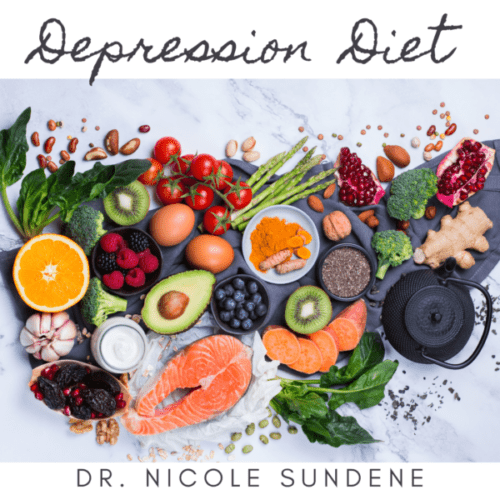
"What diet should I be eating for my depression?"
Megan H Scottsdale, AZ
Proper diet for depression is imperative to prevent depression, improve depression and reduce the need for antidepressants naturally.
Symptoms of depression typically include chronic fatigue, sleep disturbances, changes in appetite, headaches, backaches, digestive problems, irritability, loss of interest or pleasure in everything in general and feelings of worthlessness or inadequacy. Commonly there can be a preoccupation with death that sometimes results in suicidal ideation and/or attempts. Poorly controlled depression can be life-threatening, therefore the following "Depression Diet" I will discuss should be implemented under the direct supervision of a Naturopathic Doctor. Treatment options vary widely, though any given treatment does not necessarily work for everyone. Keep in mind even with traditional Psychiatry patients often are rotated through several antidepressants or anti-anxiety medications before the correct fit is found.
The Hallmark Sign that women are experiencing depression from Hormone Imbalance such as PMS, PCOS, Menopause, Perimenopause, Hypothyroidism, or Hashimotos is when we see a fluctuation or sudden shift in symptoms. For most women, it is monthly. Some women will have a mood crash in their 40's and 50's with perimenopause or menopause. I always find this more concerning when women with normal hormonal changes are put on antidepressants they don't need. Women with few situational triggers that fail to respond to traditional antidepressants and still feel flat, blah and lifeless are likely in need of Hormone Testing.
The same is true for Natural Medicine for depression. Most research studies on natural medicine and nutrition for depression show improvement around week 8. That means you should try something for a few months before deciding it does not work. It is not realistic to take a natural medicine one time and expect all depression to go away.
The Role of Diet in Depression
Diet greatly influences the brain’s behavior. The levels of brain chemicals known as neurotransmitters, which regulate our behavior and are closely linked to mood, are controlled by what we eat. Many of the neurotransmitters needed for a happy mood are made in the digestive tract. Therefore patients with GI symptoms may be more prone to depression and anxiety. The neurotransmitters most commonly associated with mood are dopamine, serotonin, and norepinephrine. Deficiencies, excesses, or imbalances of these brain chemicals cause mental and emotional disturbances and affect our perception of pain and pleasure.
Neurotransmitters carry electrochemical impulses between cells. Serotonin plays a role in mood, sleep, relaxation and appetite. Dopamine and norepinephrine play a role in hunger, thirst, digestion, blood pressure regulation, heart rate, respiration, thermoregulation, aggression, and sexuality. Neurotransmitter Testing can safely identify via urine which Neurotransmitters are running low and causing depression or alternatively which excitatory neurotransmitters are running high and causing anxiety.
The production of neurotransmitters are dependent upon amino acid levels, B-Vitamins, minerals like magnesium, iron, copper, and selenium. Therefore deficiency in one or multiple "ingredients" that are required to make the neurotransmitter you need to feel happy can greatly impact your mental health and result in anxiety, depression, OCD, ADHD, or worsen PTSD.
Chronic anxiety can lead to a burnt-out depressed state due to "Adrenal Fatigue." Depression caused by adrenal fatigue does not improve with antidepressants and requires a completely different treatment plan. Patients with suboptimal hypothyroidism or poorly managed thyroid disease can experience "Thyroid Depression" which also does not respond well to antidepressants. In women's health hormone imbalance is often the underlying cause of mental health issues.
Adequate protein consumption and absorption (requiring proper digestion) is essential in order to have enough precursor amino acid building blocks in order to synthesize any neurotransmitters. Their production also requires nutrients such as fatty acids, Vitamin B3, iron, folate, Vitamin B6, copper, calcium, magnesium, and lecithin, among others. The absorption of precursor amino acids depends on the consumption of adequate complex carbohydrates.
Note: The dietary recommendations and guidelines below include foods to which some individuals may have allergies, intolerances and sensitivities. In those cases, those foods should be avoided. Persons taking medications should not consume any of the herbal teas described without first consulting with me or your Naturopathic Doctor, Psychiatrist or Holistic Psychologist regarding potential interactions. Dietary choices should be modified to meet your personal dietary needs. Consult your Naturopathic Doctor or Holistic Psychiatrist for further information regarding nutrition and your individual medical condition.
Depression Diet Guidelines
• Avoid sugar and both artificial and natural sweeteners of all types, even honey, molasses, and fruit juice. Stevia is the only acceptable “sweetener” in my humble opinion as a biochemist and Naturopathic Doctor. Alcohol sugars should also be avoided. Do not use splenda or aspartame.
• Avoid alcohol, caffeine, and soft drinks. For each high, there is a low.
• Avoid junk food, processed and refined foods, foods high in saturated fats, or hydrogenated (trans) fats. Healthy fat choices include polyunsaturated and monounsaturated fats and oils that are organic and cold-pressed. I generally cook with olive oil.
• Food choices should be whole foods (unprocessed and unrefined), organic whenever possible, including at least five servings daily of vegetables and fruits. Grains should be whole and unrefined, especially rice, corn, and quinoa. Fresh food is always preferable to frozen and frozen is always preferable to canned.
• Identify and eliminate food sensitivities. Gluten found in some grains has been linked to depressive disorders. Gluten-containing grains include wheat, spelt, rye, triticale, oats, barley and kamut. I have seen just this step alone be the only thing some of my depressed patients need. If you cannot afford the Food Sensitivity Test then go off gluten for at least 2 weeks if not 4 to really see the mental health impacts. To test gluten you must eliminate it properly and then challenge gluten by eating high amounts of it three times per day for three days. Gluten often gives my patients a "Mental Health Hangover" and they feel great when they are eating it, but feel more depressed and anxious the next few days
• Eat adequate lean sources of protein (0.8 g/kg body weight daily). Amino acids from protein are needed to make neurotransmitters that make us feel happy. The #1 issue I see commonly in my women's health practice is women not eating enough protein. I shudder every single time a depressed or anxious woman tells me they eat zero protein for breakfast and all carbs. Personally, I would be asleep by 10am if I did that and in a terrible mood. Many of you eat a diet of all fat, carbs and fruit and are truly starved of protein. How can a brain be happy like that? Instead, emphasize wild, cold-water fish (salmon, halibut, mackerel, etc.), legumes, nuts and seeds. Organically raised poultry and eggs are also good protein sources. Fermented dairy products are also acceptable (yogurt, kefir, cheeses, etc.)
• Balance blood sugar by "Stacking Your Macros" ie: every meal and snack should be balanced, containing some protein, fat and complex carbohydrates. Low blood sugar episodes trigger depression, anxiety, and panic attacks.
• Increase Omega-3 oils via walnuts, fish, chia and flaxseed. Other nuts DO NOT CONTAIN OMEGA-3. You should NOT supplement with an Omega-6 or 9 supplements for "brain health" as that is totally useless marketing hype. You are getting enough of this in your diet and cooking oils. We are all notoriously deficient in Omega-3 and the lower your Omega-3 and higher your Omega-6 and 9 the WORSE your mood will be.
For more information on herbs used to treat depression check out my other mental health blogs: "9 Natural Treatments for Depression." and "Seasonal Depression: Natural Treatments." Always work with a Naturopathic Doctor such as myself and do not use natural medicines without the support of a trained "Holistic Psychiatrist" as this can be dangerous. Here are a few examples of teas that patients enjoy drinking for their mood:
Happy Days Tea: 1 part red clover, 1 part calendula blossoms, 1 part nettle leaves, 1 part oatstraw, 1 part basil leaves. Blend all herbs in a jar, Add 1 Tablespoon per cup boiling water. Cover and steep 15-20 minutes. Drink as desired.
Mood Lifting Tea: 2-1/2 cups cold water, 2 Tbl Ashwagandha, 4 green cardamom pods, 1 cinnamon stick, 4 cloves, a few slices of fresh ginger root. Place the water and spices in a pan and heat to nearly boiling. Cover and simmer for one hour over low heat. Strain and serve with nut milk and stevia.
Note: In addition to dietary interventions, adequate daily exercise, sleep, full-spectrum lighting and counseling or other mental/emotional support are important factors in reversing depression and are prescribed in conjunction with supplements, botanicals, and homeopathy.
Work on things gradually one at a time. Start one new natural medicine every 3-7 days and keep track on your calendar when you stop and start them so your Naturopathic Doctor can help determine if your plan should change. Most research studies on Herbal Medicine note improvement in the participants at 8 weeks. So please give natural medicine as much time to work as a medication. It is impossible to know if you will improve with any mental health medicine in under two weeks. Natural or prescription. I am super impatient so I want to remind everyone that this is a marathon and not a sprint.
Pick the Naturopathic improvements that you can most easily make and start with those first. Inform your friends and family that you are trying to eat differently so that you will feel better. Ask for their support while making these changes. Depression is a serious condition that requires support from a physician, counselor, or another qualified therapist. Be sure to check with your health care provider before making any changes to your health care routine to ensure that you get the best care possible.
Thank you for sending your Naturopathic Women's Health questions to me on a postcard so I can get something in the mail that is not a bill. Remember if it can't fit on a postcard you need to SCHEDULE an appointment with me!
Dr. Nicole Sundene
(480) 837-0900
Dr. Sundene is a Naturopathic Doctor in Scottsdale, Arizona, and is considered a Female Hormone Expert in Women's Health and Bioidentical Hormones. She specializes in Holistic Women's Health for Menopause, Thyroid, Hashimotos, PMS, Perimenopause, Autoimmune, Postpartum Depression, Chronic Fatigue, Depression, Anxiety, Food Allergies, Digestion, Dermatology , Acne, Psoriasis, Eczema and Adrenal Hormonal Conditions. In 1999 she began working for a Hormone Doctor prior to starting Naturopathic Medical School. With over 23 years of experience in both Prescription and Natural women's health and hormones, she presents to women the best-integrated health solutions for their Chronic Disease. She has been an Herbalist for over 28 years and enjoys teaching women how to use herbs to balance their hormones, nutrition and optimize their health. Dr. Sundene relies on blood testing for her hormone metrics. The hormone testing is covered per the patient's insurance plan and conducted at certain points in the woman's menstrual cycle. To learn more about Hormone Testing for Women Visit: Bioidentical Hormones. Follow Dr. Sundene on Instagram, Twitter, and Facebook for more tips on Women's Health, Female Hormones, and Naturopathy!


